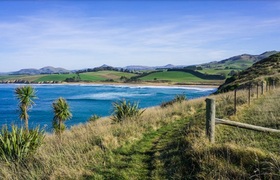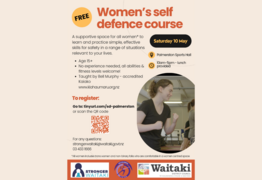Diversification almost crucial to farm survival, group told
Ashley Smyth
05 May 2025, 9:05 PM
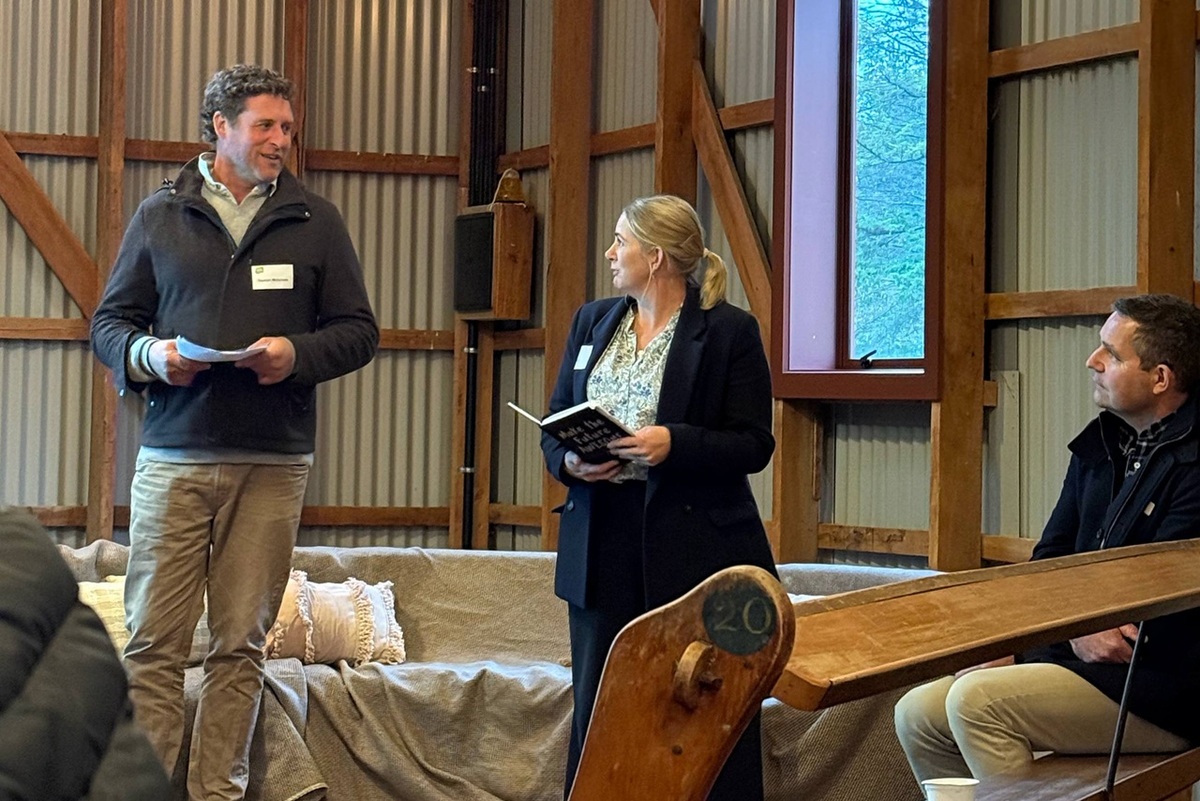 Temuka commercial grower Hamish McFarlane and Maheno farmer Jo Hay speak at a land diversification workshop, held at Altavady Barn last week. Photo: Supplied/Kate Faulks
Temuka commercial grower Hamish McFarlane and Maheno farmer Jo Hay speak at a land diversification workshop, held at Altavady Barn last week. Photo: Supplied/Kate FaulksComing up with more than one way to use farm land is almost a necessity these days, and a workshop held in the Waitaki last week offered inspiration for farmers and land owners looking to diversify.
The event was a collaboration between Waitaki District Council and the NZ Institute of Primary Industry Management (NZIPIM) and was attended by close to 100 people.
The aim was to help farmers and rural professionals understand new market opportunities and how to diversify their farms based on the region’s climate and landscape.
It was hosted at Altavady Barn, near Awamoko, by council business and enterprise growth lead Rebecca Finlay and NZIPIM North Otago/South Canterbury board and committee member and farm advisor Julian Gaffany.
NZIPIM is the professional body for rural professionals in New Zealand, primarily farm consultants, and has about 1400 members nationwide.
Rebecca said she hoped the event would help provide those attending with the confidence to “explore practical sustainable and profitable ways to diversify their land use”.
Speakers included Waitaki MP Miles Anderson; Temuka commercial grower Hamish McFarlane, Barkers of Geraldine representatives Kim Whitman and Craig France, and Agritourism operators Kate Faulks (Altavady Barn), Nic Ruddenklau (The Little Red
School House) and Liz Hayes (Nest Treehouses).
Miles spoke about his experiences as the third generation running his family’s farm and the sheep scanning business he founded to subsidise the farm income. This took him off-farm and away from his family regularly.
“I was away a lot when my kids were growing up. But, you know, most people know that you have to make some trade-offs to get ahead, and that's what we were prepared to do as a family,” he said.
“In an ideal world, we would be able to create an environment where farming businesses were enough to sustain themselves and raise a family on, and ways that diversify our land and increase profitability on it to allow us to work, live and play exactly where we want to be, at home, that's definitely something to be investigated,” Miles said.
Diversification helps ensure long-term profitability and resilience amidst climate change, market changes and shifting consumer preferences. It can also ensure succession, which is an important part of many farms' plans for the future, he said.
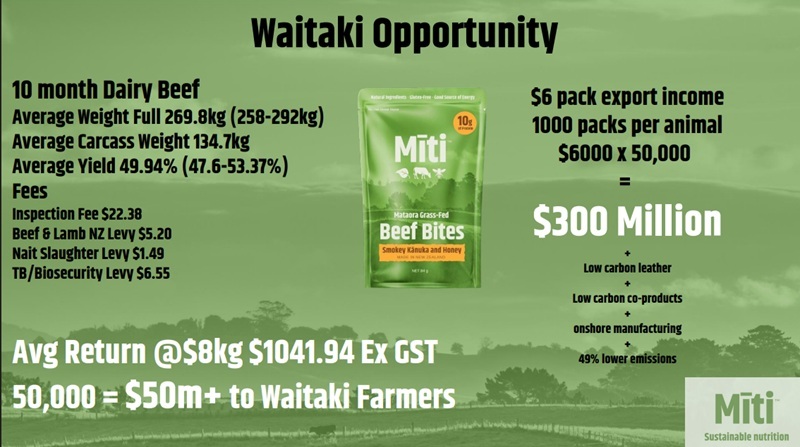
A presentation from Mīti's Daniel Carson showed the potential his product could have for Waitaki dairy farmers. Image: Supplied/Daniel Carson
Daniel Carson shared the possible benefits for the Waitaki from grazing non-replacement dairy calves and allowing them to have a longer life, before using them to produce the low-carbon beef snack, Mīti.
Medical herbal expert Phil Rasmussen spoke about his work, the history of medicinal plants, and the relevance and potential of the Waitaki Grown medicinal crop trials he is consulting on.
Waitaki Grown is a small group of local farmers and council economic development team members who have been working together since September 2023, through the Government’s Better Off fund.
The group chose five medicinal crops - peppermint, baical skullcap, withania (sometimes better known as ashwaganda), liquorice and astragalus, which research indicates should grow well in the Waitaki topo climate.
Rebecca explained how Waitaki District Council adopted an economic development strategy in September 2022, which moved away from focusing exclusively on tourism and recognised other pillars of the economy which drive it.
“Land and water” is one of the main five pillars.
“Enabling sustainable, resilient, primary industry fit for now that will endure into the future as a key strategic opportunity.”
Hamish McFarlane and North Otago farmer Jo Hay then shared insights from a recent trip up north as part of the Rural Leaders Value Chain Study cohort, visiting apple, kiwifruit, milk and meat producers, and observing advances in innovation and distribution.
A pre-event survey, identifying why diversification is important to attendees, highlighted four main themes: to spread risk - “you shouldn’t put all your eggs in one basket”; to have a new point of interest - so doing something that provides interesting options outside the usual farming; and to be more environmental.
“And you also want to be profitable,” they said.
“A second income stream, a key to succession, to remain on-farm and increase agency around your farming business.”
Following the event, one person's feedback was "it was an inspirational line-up of speakers (who did not disappoint), and diversification is an aspiration of many farmers so its good to keep up with any exploration along this line".
Rebecca said the event was a “great recipe for action” and it showcased “quiet, creative innovation, which is a hallmark of the Waitaki”.
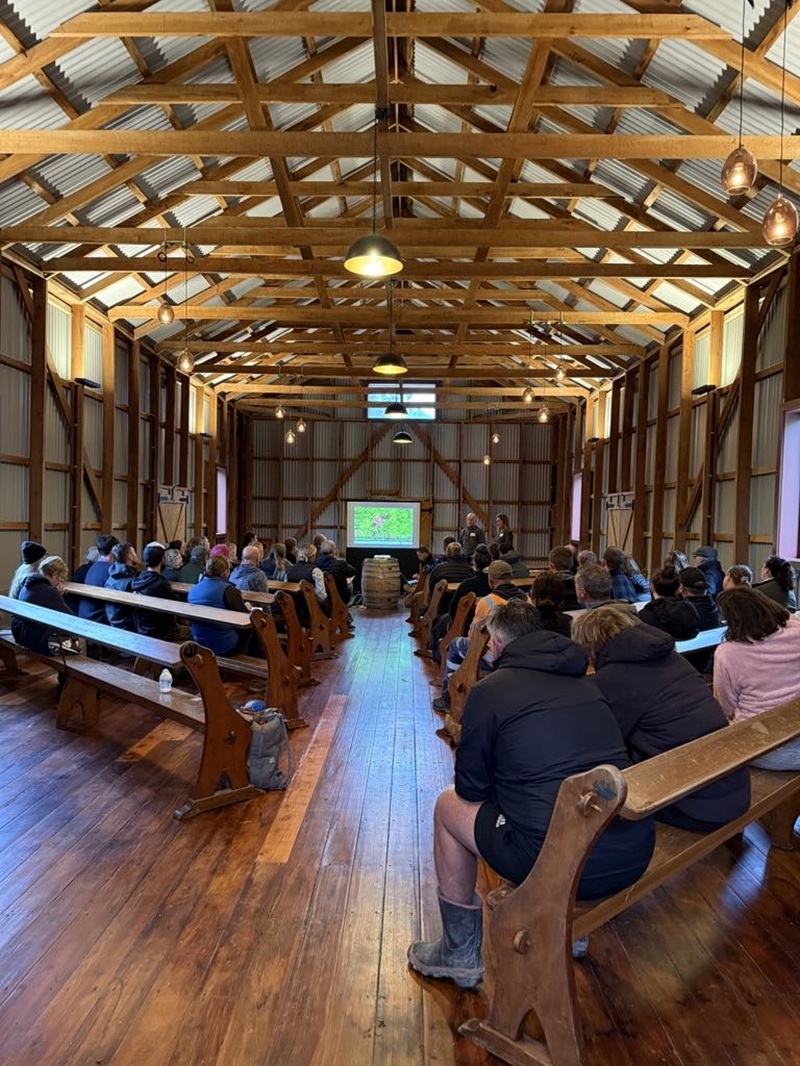
Paying close attention. Photo: Supplied/Kate Faulks
NEWS
WHAT'S ON GUIDE

